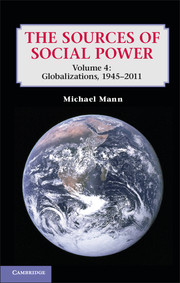Book contents
- Frontmatter
- Contents
- 1 Globalizations
- 2 The postwar global order
- 3 America in war and cold war, 1945–1970
- 4 U.S. civil rights and identity struggles
- 5 American empire during the cold war, 1945–1980
- 6 Neoliberalism, rise and faltering, 1970–2000
- 7 The fall of the Soviet alternative
- 8 The Maoist alternative reformed
- 9 A theory of revolution
- 10 American empire at the turn of the twenty-first century
- 11 Global crisis
- 12 Global crisis
- 13 Conclusion
- Bibliography
- Index
- References
11 - Global crisis
The great neoliberal recession
Published online by Cambridge University Press: 05 January 2013
- Frontmatter
- Contents
- 1 Globalizations
- 2 The postwar global order
- 3 America in war and cold war, 1945–1970
- 4 U.S. civil rights and identity struggles
- 5 American empire during the cold war, 1945–1980
- 6 Neoliberalism, rise and faltering, 1970–2000
- 7 The fall of the Soviet alternative
- 8 The Maoist alternative reformed
- 9 A theory of revolution
- 10 American empire at the turn of the twenty-first century
- 11 Global crisis
- 12 Global crisis
- 13 Conclusion
- Bibliography
- Index
- References
Summary
Chapter 6 narrated the rise of neoliberalism and its faltering at the beginning of the twenty first century. But deregulation and financial growth had continued to steam ahead, especially in the North of the world. As many have noted, periodic surges in financialization have occurred since at least the fifteenth century and they have tended to lead to major financial crises, like the South Sea Bubble or the Great Depression. The problem is generated by an overaccumulation of capital, which becomes too great to be invested in productive activity. Thus investors switch to investing in financial instruments, which are less bound by real material resources. Keynes had worried about this tendency in his General Theory (1973 edition: 159–61), noting “So long as it is open to the individual to employ his wealth in hoarding or lending money, the alternative of purchasing actual capital assets cannot be rendered sufficiently attractive … except by organising markets wherein these assets can be easily realised for money.” Such financialization might deepen and become more leveraged and Keynes feared lest the “enterprise becomes the bubble on a whirlpool of speculation … When the capital development of a country becomes a by-product of the activities of a casino, the job is likely to be ill-done.”
Hyman Minsky (1982) then built on Keynes to advance his financial instability hypothesis, according to which advanced capitalist economies shifted toward more fragile financial structures not supported by the underlying accumulation process, thereby generating crises. These came in three phases, he believed. The first one, “hedge finance,” remained healthy since expected future revenue from investments exceeded running costs, while payments of debt and interest charges conformed to normal accounting standards. The second phase involved riskier “speculative finance,” in which debt and interest charges must be met either by selling assets or by further borrowing. Then in the third disastrous phase, “Ponzi finance,” debt and interest charges can only be met by selling on the assets, which sales then continue upward until finance so outruns the real economy that the system collapses. Minsky did not offer an explanation of this sequence, but as a description it is what actually happened over the last three decades, and on a global scale. I seek now to explain its causes and initial consequences. Obviously this chapter will deal mainly with economic power relations, though ideological and political power will also figure.
- Type
- Chapter
- Information
- The Sources of Social Power , pp. 322 - 360Publisher: Cambridge University PressPrint publication year: 2012



